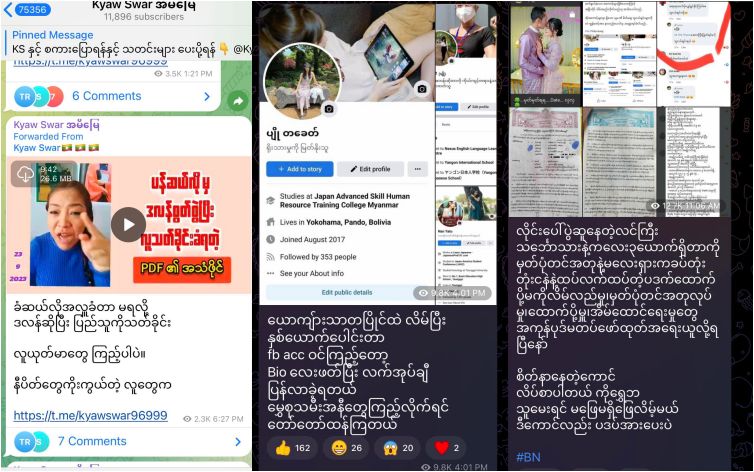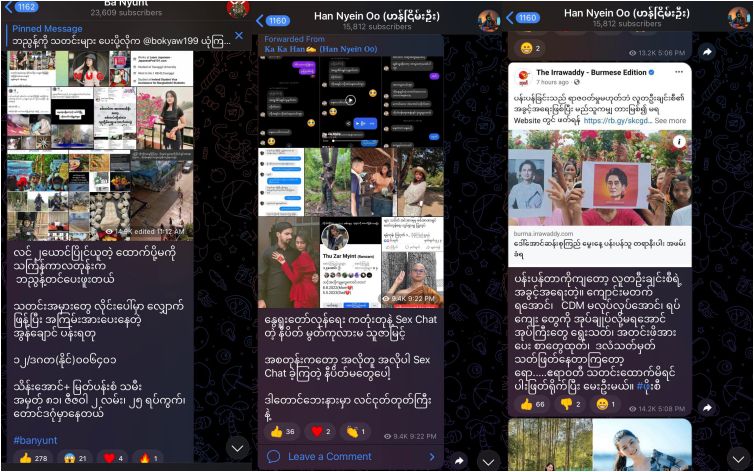“The troublemaker of Myanmar already has one foot in the grave. Should she die now, perhaps she would be worshiped as NUG Goddess.”
This was the caption for a photo-shopped picture of jailed civilian leader Daw Aung San Suu Kyi recently published on the pro-junta Telegram channel “Ba Nyunt” and then shared by other likeminded channels on the platform.
Daw Aung San Suu Kyi was called “Ma Tin Shwe” in the caption, a pronoun used to refer to any woman. “NUG” is the acronym for the parallel National Unity Government.
The hateful caption was just one of many defamatory posts created by pro-junta Telegram channels about the Nobel laureate, civilian leader, and champion of democracy at home and abroad, according to the Beautifier of Diversity Network, which monitors pro-regime Telegram channels.
“Women are always targeted,” said a monitor from the network, which has been monitoring 13 social media accounts, including pro-junta Telegram channels that spread hate speech.
Hate speech has surged on social media platforms since the coup. The platforms are used not only to incite violence, but are also as breeding grounds for launching and amplifying hatred against individuals, and ethnic, religious and sexual minorities, the network said.

A wave of hate speech targeting women followed the release of a film labeled “blasphemous’ by the regime, according to data from the network.
The movie “Don’t Expect Anything” was written and produced by Swiss director Didier Nusbaumer and uploaded to the YouTube channel “Isi Dhamma” on July 24. The regime alleged that the film harmed Myanmar’s culture and Buddhist traditions, and arrested its director and cast.
Research by The Irrawaddy has also found that hate speech degrading women always accompanies attacks on revolutionary figures.
Criticism and denunciation accounted for 39 percent of hate speech, insulting posts accounted for 27 percent, threats accounted for 15 percent, and incitement to violence accounted for 13 percent, according to research conducted by the Beautifier of Diversity Network from June to August.
Article 20 of the International Covenant on Civil and Political Rights states that “any advocacy of national, racial or religious hatred that constitutes incitement to discrimination, hostility or violence shall be prohibited by law.”
According to research by independent organizations, the rise of hate speech since the coup can be divided into three groups—hate speech on the grounds of race, religion, political beliefs and sexual orientation; posts that provide details about dissidents including their home addresses and calls for arresting, killing or raping of them; and posts that portray those involved in Spring Revolution as terrorists, traitors or criminals.
Hate speech against women, including pro-democracy activist Pencilo, a key figure involved in raising funds for the revolution, are posted daily on social media.
Non-Buddhist women are subjected to racially, religiously, and sexually discriminatory and derogatory remarks. Recently, several pro-junta Telegram channels, including “Han Nyein Oo” shared a post accusing Muslim Ma Thuzar Myint of committing adultery, and participating in a sex chat with a fake Buddhist monk who participated in the Spring Revolution.
The post used a common racial slur for people of Indian origin (“kalar”) to describe Ma Thuzar Myint, who is a supporter of the National League for Democracy.
Ma Thuzar Myint and at least one other woman were sexually abused online by Buddhist monk Ashin Kethara, who calls himself the Spring Revolution Sayadaw. Pro-junta Telegram channels have exploited his misogyny to attack all people involved in raising funds for Spring Revolution.
Ma Thuzar Myint said: “They tend to chastise women more severely in a way to degrade and cheapen them. I feel like women suffer more from hate speech than men. I myself have [been a] victim. Women are criticized twice as much as men are.”
About a dozen pro-junta Telegram channels operate as a network, sharing propaganda and hate speech. Some channels, including “Ka Ka Han” and “Hmine Wai,” have more than 60,000 subscribers each.
Hate speech is not only perpetrated on regime-friendly social media. Some individuals and organizations who support revolutionary forces fighting for democracy and human rights also spread hate speech.
Pro-democracy activist Ma Thinzar Shunlei Yi, who leads the Sisters2Sisters campaign that raises awareness about sexual violence perpetrated by the military junta, said:
“Regarding the attacks on people serving in the regime, often they are targeted by hate speech for their gender and their sexual orientation. And often vulgar language is used against women civil servants who do not join the Civil Disobedience Movement.”

The junta’s tourism minister, Daw Thet Thet Khine, is often attacked by anti-junta social media users. Most of the hate speech directed towards her focuses on her transgender husband, Dr. Aung Kyaw Win. This is usually hate speech against the LGBT community in general and same-sex marriage in particular. Both pro-junta and resistance members use it.
Pro-democracy activists fighting the regime have been urged to avoid attacking people on the basis of their race, religious beliefs or sexual orientation. While social cohesion, understanding and integration are necessary to resist the wave of hate speech created by the regime, it is also important that those who oppose the regime do not use hate speech, rights activists and hate-speech monitors say.
Ma Thinzar Shunlei Yi said the increase in sexist hate speech is attributable to the nature of Myanmar’s military, which is steeped in sexism.
More than half of those who were arrested after being identified by pro-junta Telegram channels as anti-junta have been women. Of the more than 1,100 people arrested from February 2022 to May 2023, 57 percent of women were women, according to an analysis of arrests reported in junta media.
Women detainees continue to be subjected to online abuse and sexism after being arrested. After actress May Pan Che and singers Shwe Yi Thein Tan and May La Thazin were arrested for expressing their condolences for the victims of the junta’s deadly air strikes on Pazi Gyi Village in Sagaing Region, they were labelled whores who deserved no mercy.
Telegram channel “Han Nyein Oo,” which has over 16,000 subscribers, called them prostitutes, adding: “I want to see photos of them handcuffed and kneeling on the ground like other detained loose cannons. Those bitches must be suppressed. Why show mercy to them?”

















